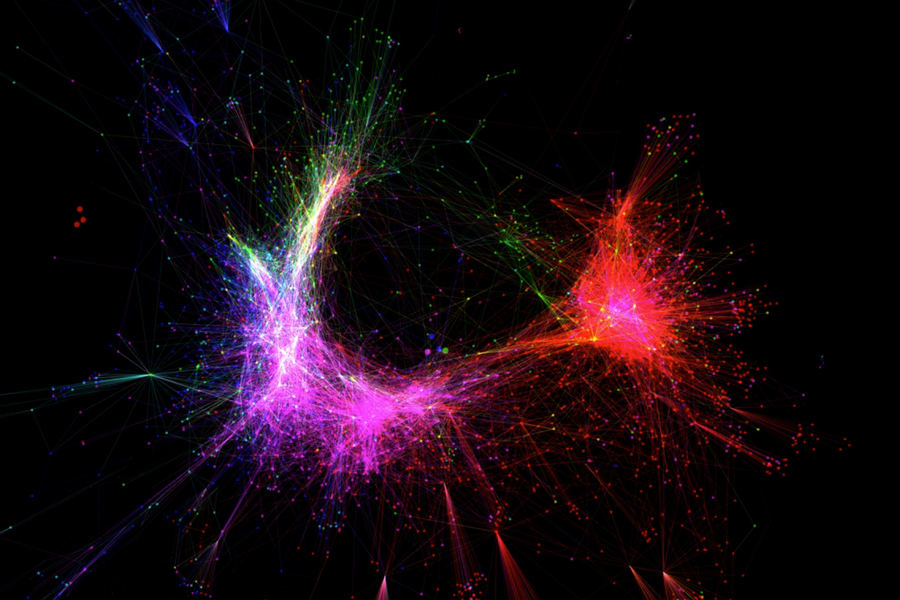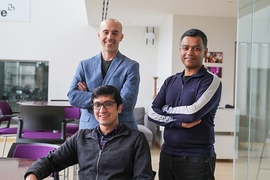Today MIT announced the launch of the interdisciplinary Center for Constructive Communication, which will leverage data-driven analytics to better understand current social and mass media ecosystems and design new tools and communication networks capable of bridging social, cultural, and political divides.
An important aspect of the new center is its commitment to reach beyond academia to work closely with experienced, locally based organizations and trusted influencers in underserved, marginalized communities across the country. These collaborations will be critical for launching pilot programs to evaluate which tools offer the greatest potential to create more trusted communication within our deeply fragmented society.
Based at the MIT Media Lab, and fostering collaborations across the MIT campus and beyond, the center is being established with over $10 million in commitments from foundations, corporations, government programs, and philanthropists. It will bring together researchers in artificial intelligence, computational social science, digital interactive design, and learning technologies to collaborate with software engineers, journalists, artists, public health experts, and community organizers.
The center will be directed by Deb Roy, professor of media arts and sciences, whose work on machine learning, human-machine interaction, analysis of large-scale media ecosystems, and advancing constructive dialogue will be integrated into the new center’s broad research program. For the past year, Roy also served as the executive director of the Media Lab. As an entrepreneur, Roy was co-founder and CEO of Bluefin Labs, a media analytics company acquired by Twitter in 2013, and is co-founder and chairperson of Cortico, a nonprofit collaborator with the center that builds systems for bringing underheard community voices into a healthier public sphere.
“Social media technologies promised to open up our worlds to new people and perspectives, but too often have ended up limiting and distorting our understanding of others,” says Roy. “Last week’s violence in Washington, D.C. — carried out by a mob mobilized largely in online bubbles — laid bare the challenge at hand. We now live in a fragmented society dominated by the loudest, most extreme voices, stifling avenues of communication that might lead to more constructive dialogues.”
“What our new center hopes to achieve is the creation of new ‘spaces’ where diverse voices and nuanced perspectives of so many who have been marginalized can be heard, and the design of tools and methods that enable influencers and organizations to play new and even more beneficial roles in society,” says Roy.
“A societal imperative”
In addressing these highly polarizing divides with the aid of new human-machine systems, center researchers will remain firmly committed to ensuring that the AI technologies key to this effort will enhance rather than replace human capabilities, and will move quickly to identify and guard against misuse of any of the work coming out of the center.
Marking the center’s launch, MIT President L. Rafael Reif says, “A signature strength of MIT is developing technological solutions to address humanity’s great challenges. Yet those who design and benefit from advanced technologies have a special responsibility to protect society from their unintended harms. Few forces in our society today are more powerful — and therefore more dangerous — than social media. To the challenge of protecting society against social media’s potential harms and helping it fulfill its highest purposes MIT offers a unique depth and breadth of expertise. The establishment of the Center for Constructive Communication, with Deb Roy at the helm, is a significant step in this important work.”
The center’s research program, focused on creating new human-machine communication capabilities, will be advanced by center fellows from BIPOC (Black, Indigenous, and people of color) and other communities, who work in media and communications, health disparities, immigration, racial justice, AI, and data analytics. These fellows will be important collaborators in designing, testing, and deploying strategies that build on ongoing research that uses AI-powered tools for listening, mapping, and shaping how information spreads.
“Involving trusted local influencers and organizers in the creation of these new capabilities is critical to addressing the harms of misinformation on societal issues such as Covid-19, immigration, and poverty,” says Ceasar McDowell, professor of the practice of civic design and associate head of the Department of Urban Studies and Planning, who will oversee the center’s fellowship program. “This requires building local capacity to use sophisticated communication analytics, to effectively identify, understand, and counter misinformation that threatens the health, safety, and security of marginalized communities.”
Martha Minow, the 300th Anniversary University Professor at Harvard University, who serves as a senior advisor to the center, stresses the importance of its work in maintaining a healthy pluralistic democracy. “In recent years, we’ve seen just how quickly an epidemic of misinformation and broken communication networks can expose the frailties of our democracy,” says Minow. “Opening trusted communication channels, encouraging dialogue across the full political spectrum, and engaging our most marginalized communities is not merely a wish list — it is a societal imperative.”
Building on the Laboratory for Social Machines
The Center for Constructive Communication represents the evolution and scaling of the Laboratory for Social Machines (LSM), which was established by Roy at the MIT Media Lab in 2014 and today includes a research team of approximately 30. LSM’s work built on Roy’s earlier Media Lab research on language analysis, and expanded it into social media analytics often presented through data visualization that detailed social media and media ecosystems.
More recently, LSM has expanded into the design of social technologies to support communication and learning across divides, establishing a track record that includes:
- more than 160 peer-reviewed publications in human-machine communication and learning;
- a study, in collaboration with Sinan Aral, the David Austin Professor of Management, on the spread of false news that was the cover story of Science magazine;
- a tech-assisted coaching system, Learning Loops, for supporting kids’ narrative development, already successfully piloted with hundreds of participants in collaboration with community organizations; and
- Beat the Virus, a coalition, created in close collaboration with global health expert, visiting professor, and former U.S. Assistant Surgeon General Susan Blumenthal, created in response to Covid-19, to deliver science-grounded public health guidance via social media influencers and to serve as a resource hub for trusted information about the pandemic. In addition, LSM social media analytics guided the generation of over 650 million media impressions and 5.5 million engagements with no paid media.
The new center will incorporate all work currently underway in LSM, including:
- PULSE (Public Understanding, Listening, and Sense-Making Engine), a collection of tools and methods for combining human listening with machine learning to make sense of public expressions of opinion and lived experience;
- HealthPULSE, a public health communication system that leverages the PULSE toolkit to navigate our fragmented media landscape to provide reliable and relevant public guidance;
- Clover, a pro-social media network designed to promote positive identity development, a sense of belonging, and exploration for tweens and early teens; and
- StoryLine, media and content analytics for understanding how the content of stories connects with the audiences of stories.
Through a cooperation agreement with Cortico, the center incorporates Local Voices Network (LVN) data and methods in many projects. LVN aims to build infrastructure for a stronger democracy through technology-powered insights from small group facilitated conversations connected in a network of community engagement.
In addition to current collaborations with Cortico, New America, 826 Boston, and Frontline/PBS, the center is seeking to expand its relationship with numerous additional organizations across fields — organizations best suited to building the kind of trust needed to achieve meaningful change.









